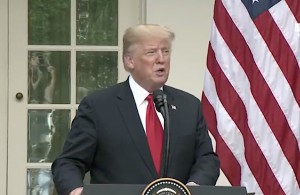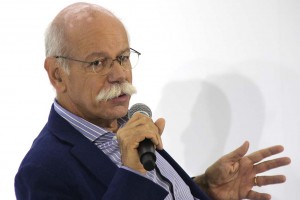Even as President Donald Trump was backpeddling on earlier comments suggesting the trade dispute with China had been defused, the former New York businessman was meeting with European auto industry executives worried that they could become targeted by yet another front in the trade war.
The president has signaled he may enact duties of 25% or more on vehicles imported from Europe, even though his own Commerce Dept. has backed away from plans to declare imported automobiles a threat to national security.
Trump “shared his vision of all automakers producing in the United States and creating a more friendly business environment,” the White House said in a statement that followed the meeting with officials from BMW, Daimler and Volkswagen.
The administration did not offer a detailed outline of what had been discussed during the meeting, though tariffs were considered a likely topic considering comments the president made using Twitter last week.
(Volkswagen may use Ford plants for vehicle production. Click Here for the story.)
“Get smart Congress,” read a tweet posted on Nov. 28, “the countries that send us cars have taken advantage of the U.S. for decades.”

VW CEO Herbert Diess probably told Trump the news he most wanted to hear: VW is considering building a second plant here.
The president has been relying on the threat of tariffs to get foreign automakers to reduce exports to the U.S. and shift more factories to American soil. But that was actually happening already. Volvo this year opened a new plant in Charleston, South Carolina, while VW, BMW and Daimler have all been expanding existing facilities in the States – as have a number of Asian manufacturers.
The White House has, if anything, been warned that new tariffs could be counterproductive. Volvo, for one, had originally planned to export about half of the vehicles produced in Charleston. But officials said last week they would slow the ramp-up of the new plant, and reduce hiring, because demand for the S60 sedan has plunged in China as a result of that country raising tariffs to 40% on American-made automobiles in response to higher U.S. duties.
“We … thought Charleston could build cars for China,” Volvo’s global CEO Håkan Samuelsson told USA Today during an interview at the Los Angeles Auto Show last Wednesday. “That will not work,” Samuelsson added, noting that Volvo would consider shifting some production from Charleston to China, impacting production levels and hiring at the plant.
BMW has also warned that it might shift some SUV production out of its Spartanburg, South Carolina plant due to the Chinese tariffs. It had been planning a further increase in capacity with the launch of its new sport-utility vehicle flagship, the X7.
Both sides tried to sound a positive note coming out of the Tuesday meeting at the White House, VW taking steps that could appease the president. Referencing comments made last month, CEO Herbert Diess said after the Washington conference that the automaker is “considering building a second car plant.” It is expected to be focused on building new battery-electric vehicles of which VW and its dozen brands hope to have as many as 50 all-electric models in production by the middle of the coming decade.
(Click Here for details about Trump, White House backtracking on China tariff deal.)
Diess also noted that, “We are in quite advanced negotiations and dialog with Ford to really build up a global automotive alliance, which also would strengthen the American automotive industry.”
A senior source involved in those negotiations told TheDetroitBureau.com that VW and Ford will likely work together to develop and produce commercial vehicles. But there could be several other joint projects, the source hinted, including ones involving both electric and autonomous vehicles.
For its part, BMW issued a statement saying that, “At a constructive working meeting with representatives of the U.S. administration, the BMW Group today took the opportunity to explain in detail the extent of its footprint in the USA.” The Bavarian automaker also said it told the president that, “the BMW Group is considering setting up a second site for powertrains in the United States.”
Scoring anything from the European automakers could help Trump shift focus away from the ongoing disputes over imported aluminum and steel tariffs – which are expected to cost automakers billions of dollars this year alone – as well as the trade struggle with China.
On Sunday, following a lengthy dinner with his Chinese counterpart Xi Jinping, Trump boasted to reporters at the G-20 summit in Argentina that he had come up with an “incredible” trade deal. He subsequently tweeted that, “China has agreed to reduce and remove tariffs on cars coming into China from the U.S. Currently the tariff is 40%.”
But the White House has since been trying to back off those original comments, indicating that there was, in fact, no deal reached. On Tuesday, even Trump had to come clean, now saying negotiations were getting underway and that they “probably will” lead to an agreement settling the trade dispute.
(To see more about Volvo adjusting its manufacturing plans in South Carolina, Click Here.)
He also stressed his 90-day countdown for reaching a settlement. Declaring himself “a Tariff Man,” he said he could alternately issue massive new tariffs against China.



Tariffs are such a bad idea. Just because Germany ships us a car, doesn’t mean we are being ripped off. Besides, all it does is raise prices for Americans, who Trump claims he is protecting. It also acts as a job killer, as outlined in the article. I know in Trump’s small minded view of the world every deal has a winner and a loser, but in my mind, that is not the way to build a successful business or a successful relationship with other countries.